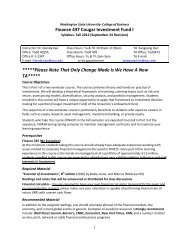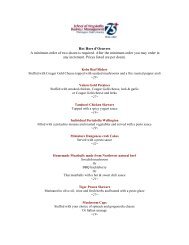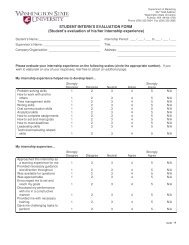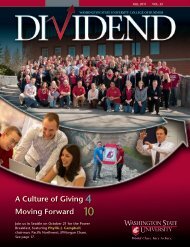Hospitality Business Management: - College of Business ...
Hospitality Business Management: - College of Business ...
Hospitality Business Management: - College of Business ...
You also want an ePaper? Increase the reach of your titles
YUMPU automatically turns print PDFs into web optimized ePapers that Google loves.
STUDENT NEWS<br />
Department <strong>of</strong> Information Systems Chair Mark Fuller and Assistant Pr<strong>of</strong>essor Mauricio Featherman work with students in the MIS classroom.<br />
Students Applaud New Mis Curriculum<br />
One year after the information systems department<br />
switched to a .NET-based curriculum, the verdict is in:<br />
students are benefiting from the change.<br />
In fall 2005, the IS department rolled out a new curriculum<br />
based on Micros<strong>of</strong>t’s .NET framework, abandoning<br />
classes on COBOL and JAVA s<strong>of</strong>tware, and focusing instead<br />
on a four-course sequence <strong>of</strong> Visual Basic C# and ASP.NET<br />
using the .NET platform. The decision was based, in part,<br />
on input from recruiters on the technical, systems, and<br />
business skills needed by graduates in MIS.<br />
“While graduates from our major go into a variety <strong>of</strong><br />
careers other than strict applications development—for<br />
example as systems analysts—our curriculum gives them a<br />
great skill set to draw on when analyzing business needs,<br />
and then helping design systems to meet those needs,”<br />
says IS department chair Mark Fuller.<br />
According to IS Associate Pr<strong>of</strong>essor K.D. Joshi, when<br />
a number <strong>of</strong> different programming languages are taught<br />
and used in courses, students’ ability to become pr<strong>of</strong>icient<br />
at any one language and progress to more advanced levels<br />
<strong>of</strong> expertise is limited. Consolidating the programming<br />
languages allows students to concentrate on course content,<br />
rather than repeatedly switching syntax. The resulting<br />
courses can guide students to previously unattainable levels<br />
<strong>of</strong> technical pr<strong>of</strong>iciency and practical understanding.<br />
“This curriculum allows us to focus on how information<br />
technology can help support business processes instead <strong>of</strong><br />
focusing on the various different integrated development<br />
environments and language specific syntax,” says Joshi.<br />
“The change in the MIS curriculum provides students<br />
with a deeper understanding <strong>of</strong> the .NET framework,” says<br />
Leah Knowles (’06 <strong>Business</strong> Administration/MIS), part<br />
<strong>of</strong> the first group <strong>of</strong> students to experience the transition.<br />
“Because students don’t need to learn different languages,<br />
courses are more integrated and focused.”<br />
“The migration to an integrated .NET environment<br />
has been very beneficial to my learning experience at<br />
WSU,” says Darren Bystrom (’06 <strong>Business</strong> Administra-<br />
24 WSU <strong>College</strong> <strong>of</strong> <strong>Business</strong>












